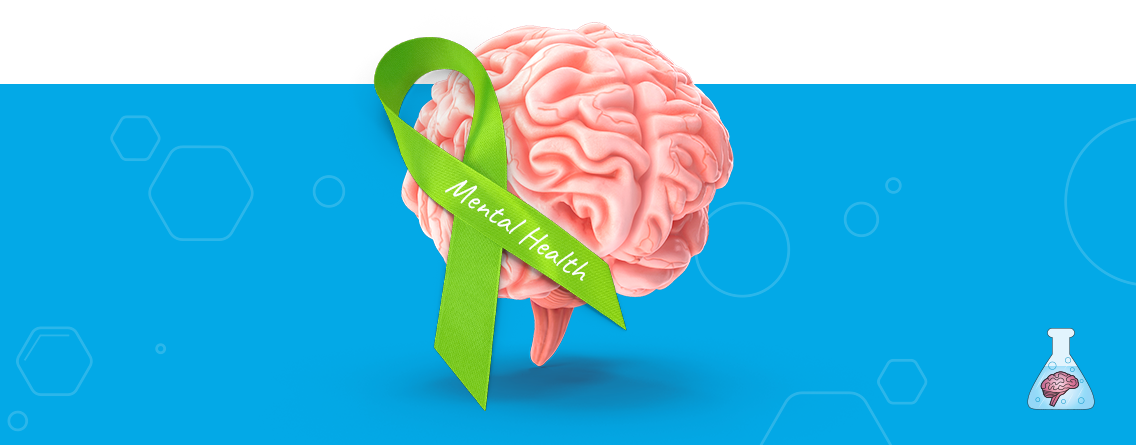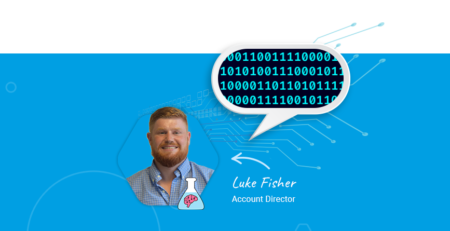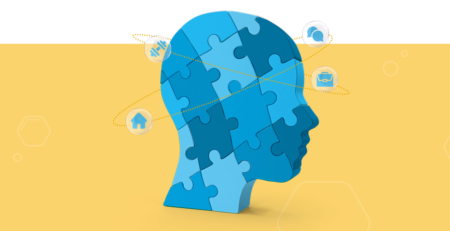A paid media expert’s perspective on dealing with depression
For this year’s Mental Health Awareness Week, I want to open up the conversation around mental health in our industry and share my experience with depression because it’s such a common experience that people should feel more comfortable talking about openly.
More importantly, I want to share the things I learned from my own experience, and give some advice on how to recognize and overcome depression. After all, the best thing we can do with a negative experience like depression is to learn as much as possible from it, and try to turn it into something positive.
Content warning: mention of suicidal ideation
My experience with depression
My battle with depression started during my last semester of college where I was obtaining my degree in Marketing Analytics. There were some key things that happened which lead up to it. The main factor being that I took an extra semester to graduate as I had changed my major – a few times! Because of this, all of my close friends had graduated and moved away, leaving me relatively isolated for that term.
I was also deeply involved with a student organization, holding multiple leadership positions throughout my time at school, the terms of which happened to end before going into my last semester, leaving me without my usual sense of purpose.
Both of these things caused me to have a less structured social life, and it also meant I wasn’t active with intramural sports and basically stopped exercising altogether. These are the conditions that set me up for the hardest year of my life. Not to mention the pressure of looking for a job after graduation after watching all of my friends land great roles at well-known companies.
Over the course of the next 6 months, I started to completely isolate myself. I frequently cancelled plans with the remaining friends I had. I skipped class most days, and dreaded going to work. All I wanted to do was stay at home and sleep, watch TV, or play video games. I was hardly eating (I had lost 40 pounds by that time), I had lost a lot of my self-confidence, and my motivation was non-existent. The search for a job after college wasn’t going well. I graduated, and it took me another 4 months to land a job. I took a front desk job at a hotel in Austin, which wasn’t what I had planned to do with my marketing analytics degree. At that point I still wasn’t fully aware of my deteriorating mental health, and kept pushing forward.
I was working long hours, 6 days a week, and living in a tiny studio apartment with my dog. I was stressed and anxious, still wasn’t eating much, and absolutely hated going to work everyday. I remember feeling so trapped in that apartment, not knowing many people in a new city, and the overwhelming feeling of wanting to just give up. At that point I realized something was wrong, I was not okay.
I quit my job, and I remember sitting in my apartment, weighing my options. I was deciding between calling my parents and telling them that I wasn’t okay and that I needed help, or suicide. It’s hard to describe how I felt at my absolute lowest point, but I remember just wanting everything to stop, I didn’t want to continue on with life. I felt like a failure, and I didn’t think I had any value to add to the world.
Fortunately, I ended up making the right choice, and I called my parents and told them everything. This was the turning point for me.
I moved back home the next day and over the course of the next 8 months I started to work on my mental health. I went to therapy, began taking antidepressants, and went back to exercising regularly. I was surrounded by a great support network and slowly started to get back to feeling like myself. I started my job search up again and eventually landed my role with Brainlabs! Through that recovery process I learned a ton about myself, and actually developed an appreciation for the experience I had gone through.
What I learned about myself from depression
At the time, I hated the fact that I was depressed. I had an idea of what my life after school would be and it was frustrating for that to be completely disrupted. I didn’t like who I was at that point in my life. I wasn’t motivated, I struggled to feel any emotions, and I had lost all of my confidence.
But, surprisingly, I’ve actually come to appreciate it. It helped me realize the things that are important to me, the things that make me who I am. It reminded me that I need to reach out to friends and family more often. Most of all, it made me a stronger person, mentally and emotionally.The knowledge I gained from my experience has made the pandemic easier to handle for me. I’ve definitely struggled this year, but at this point I know myself, I know the signs to look for, and I know the things I need to change in my life to make sure I’m mentally and emotionally well.
Therapy was a great tool for helping me understand what had led me into a state of depression in the first place, and it gave me an understanding of what I needed to change in order to get back to feeling like myself.
My therapist and I dissected what led up to my depression, and we ended up highlighting the things I mentioned before: social life, sense of purpose, and exercise. Those were the big factors in my decline in mental health. I went from having a robust, structured social life to having basically no social life for a time. I went from holding leadership positions in an organization to not being involved with the organization at all, leaving me without my sense of purpose. I went from playing sports and going to the gym multiple times per week to no physical activity at all. These are the things that are important to me, and they’re a few of the key things that make me who I am.
When they all disappeared fairly quickly, it took a huge toll on my mental health and sent me into a deep depression.
My (unlicensed, amateur) advice for coping with depression
Here are a few tips that have worked for me. Please note, they may not work for you as every experience and set of circumstances is different, but I hope some of them are helpful.
1. Learn your warning signs
It’s not easy to spot the changes in yourself, they tend to be slow and can go under the radar. A big one for me: if regular things start to feel like an absolute burden, then I know I need to change something. For example: I always wash my dishes as soon as I’m finished eating, if I start to want to put something that simple off, then I know something is up. When small, easy things start to feel overwhelming, something isn’t right.
2. Make time for what matters most to you
Understand what’s important to you, and make sure to prioritize those things in your life! It could be your family, your hobbies, your job – anything that’s a key part of who you are. If you notice that you’re ‘defined’ by one thing, maybe your job, then try to add some new things in your life. If your whole definition of self is riding on one thing and that thing disappears, it can be really destructive for your mental health. I think of it almost like diversifying risk in an investment portfolio, having a healthy number of things from which you derive your sense of self can help mitigate the effects of losing one of those things. Of course be mindful not to over-do it and stretch yourself too thin.
3. Lean on your support network
You are not a burden!
This one was hard for me as a man. We’re taught from a young age to toughen up and face things on our own, asking for help can be seen as a weakness, but it’s absolutely not. You’d be surprised how many people are willing to help in whatever way they can. When I told my friends I got 3 types of reactions: 1. Friends shared their experiences with depression with me, and I never would have guessed they had been through that experience. 2. Support, overwhelmingly they offered support and wanted to help. 3. I had some friends who I could tell didn’t know what to say. They clearly hadn’t encountered it before, and I was not someone they expected to go through it. I don’t blame them for not knowing how to react, and this is a big reason why it’s so important to talk about depression more.
4. Don’t underestimate the power of exercise
Exercise is an incredible tool for taking care of your mental health. It doesn’t have to be anything too difficult, just find something that you like to do, there really is something for everyone! For me, it’s walking (I hate running so I don’t force myself to do it) and lifting weights. During the first summer of the pandemic, I was walking over 2 hours a day and it did wonders for my mental health. Don’t be afraid to try things outside of your comfort zone, but definitely don’t force yourself to continually do things you truly dislike.
5. Understand the negative and positive feedback loops in your life
Here’s an example of a negative feedback loop: I get nervous before presentations, so I sound awkward and anxious when giving a presentation. As a result, I feel poorly about my performance, and next time I go to do a presentation I’m even more nervous, so on and so forth. This was eye-opening for me when I realized how much of an impact these things can have. It’s good to try to identify them and find a way to break the cycle for negative feedback loops, or maximize the positive feedback loops you have.
Rebuilding confidence from scratch
That brings me to the last point that I learned a lot about from my experience: confidence. When I started to feel like myself again, things like motivation and feeling more emotions came back to me. But the one thing that didn’t return was confidence.
This experience made me realize that I had never built up true confidence in myself. Instead, I was ‘living paycheck to paycheck’ as it were – using small confidence boosts from being told I did something well or the occasional compliment to tide me over until the next confidence boost came along. I got by on this for most of my life. This isn’t a sustainable way to build true confidence in yourself, and my depression exposed that. It took a long time to build up some form of true confidence, and it’s something I’m still working on. It comes from trusting in yourself, and knowing that you’ve done all you can do to prepare yourself and be the best version of yourself!
I’ll leave you with some final thoughts. Every person’s experience with their mental health is going to be unique. Prioritizing your mental health is going to cause you to learn a lot about yourself! If you really want to see a change in your life then you have to change something about the way you’re doing things. In this case the cliche holds true: it will get better.




